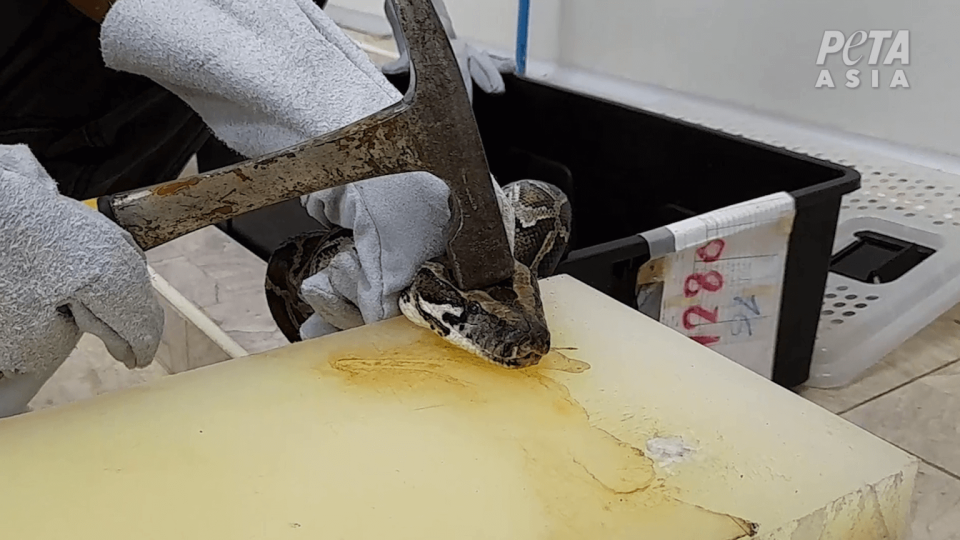PETA Sinks Its Teeth into Kering for Suppliers’ Alleged Python Abuse

PETA has aimed its latest hiss of disapproval at Kering Group.
The animal rights organization alleges that the Gucci owner’s tannery has purchased from suppliers that bash snakes’ heads in before skinning them for opulent luxury goods.
More from Sourcing Journal
The Kering Group foe released an investigation Tuesday showing graphic videos of what it alleges is footage that comes from two Thai farms that supply Caravel Pelli Pregiate SpA, a company owned by Kering.
Caravel Pelli Pregiate SpA advertises itself as a company that specializes in tanning, finishing and marketing of leather and exotic skins for high fashion. The tannery creates products for Gucci.
The H&M instigator alleges that at the two pythons farms its investigators visited—Closed-Cycle Breeding International (CCBI) and Sisatchanalai Python Farm—employees held snakes in small boxes or cages.
Ashley Byrne, PETA’s director of outreach and communications noted that the cages were too small for a snake to stretch out fully and pointed out that investigators found diseased snakes, one of which had eyes protruding from its head, on the farm.
According to PETA, the owner of one farm told the investigator it would be more productive to kill the injured snakes than to rehabilitate them.
Byrne said the remainder of what investigators found came “straight out of a horror movie.”
Footage from PETA shows men beating pythons over the head with a hammer, then stringing them up on hooks while still alive to pump their bodies full of water so they could more easily skin them.

According to Byrne, a reptile expert analyzed the footage and determined that the majority of animals maintained consciousness throughout the process.
Byrne said the cruelty displayed at the facilities does not align with Kering’s animal welfare guidelines. According to a document on the Yves Saint Laurent owner’s website, it requires python skin farms to accommodate “room to move around freely with continual access to clean fresh water,” ensure that the snakes are “cared for by competent stock people who handle the animals carefully and calmly with no mistreatment or abuse” and more.
Even if the two farms had been fully compliant with those guidelines, Byrne said, that would not be sufficient in ensuring animals did not suffer to create products for humans.
“There is no way to raise and kill animals for their skins without causing them to suffer greatly. However, that aside, these facilities don’t even come close to adhering to the so-called standards Kering is touting. They’re meaningless. Suffering is inevitable and rampant in the exotic skins trade,” Byrne told Sourcing Journal.
Byrne called on Kering to ban the use of exotic skins, just as it announced its decision to move forward without using real animal fur in 2021.
“So many brands—actually, including Gucci—have explored next-gen materials that are plant based and where no animals are harmed…and that look just as good. Consumers want these options,” she said. “It’s such a limited view to see these exotic skins as the only option for these luxury brands and their [products], when really, it is just a lack of creativity on their part; it’s a lack of vision on their part.”
Other brands, like Stella McCartney, Burberry, Chanel and Moda Operandi have already banned the use of exotic skins in their products.
Byrne said oftentimes snakes and other reptiles exploited for their skins get forgotten about because people lack the same affinity for them as they do other animals. Nonetheless, she said, their livelihood worth protecting.
“These animals have the same capacity to feel pain and suffer as a dog or a cat would. I think when people look at it in that light, they may not want to cuddle up with a snake on the couch, but you wouldn’t think they want them to live lives of misery and pain and deprivation,” she said.
Neither Kering Group nor Gucci returned Sourcing Journal’s requests for comment.

